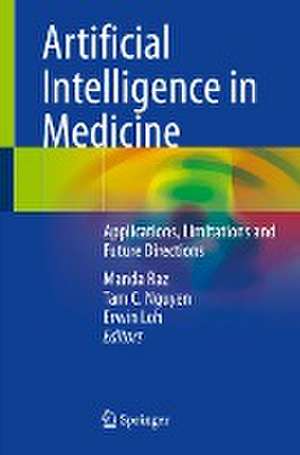Artificial Intelligence in Medicine: Applications, Limitations and Future Directions
Editat de Manda Raz, Tam C. Nguyen, Erwin Lohen Limba Engleză Paperback – 18 iun 2023
This book identifies Artificial Intelligence (AI) as a growing field that is being incorporated into many aspects of human life, including healthcare practice and delivery. The precision, automation, and potential of AI brings multiple benefits to the way disease is diagnosed, investigated and treated. Currently, there is a lack of any appreciable understanding of AI and this book provides detailed understandings, which include; foundational concepts, current applications, future challenges amongst most healthcare practitioners.
This book is suited for all readers as it requires no previous knowledge, it walks non-technical clinicians through the complex ideas and concepts in an easy to understand manner.
| Toate formatele și edițiile | Preț | Express |
|---|---|---|
| Paperback (1) | 1029.71 lei 6-8 săpt. | |
| Springer Nature Singapore – 18 iun 2023 | 1029.71 lei 6-8 săpt. | |
| Hardback (1) | 1036.64 lei 6-8 săpt. | |
| Springer Nature Singapore – 17 iun 2022 | 1036.64 lei 6-8 săpt. |
Preț: 1029.71 lei
Preț vechi: 1083.90 lei
-5% Nou
Puncte Express: 1545
Preț estimativ în valută:
197.03€ • 214.70$ • 166.03£
197.03€ • 214.70$ • 166.03£
Carte tipărită la comandă
Livrare economică 23 aprilie-07 mai
Preluare comenzi: 021 569.72.76
Specificații
ISBN-13: 9789811912252
ISBN-10: 9811912254
Pagini: 258
Ilustrații: VIII, 258 p. 1 illus.
Dimensiuni: 155 x 235 mm
Greutate: 0.38 kg
Ediția:1st ed. 2022
Editura: Springer Nature Singapore
Colecția Springer
Locul publicării:Singapore, Singapore
ISBN-10: 9811912254
Pagini: 258
Ilustrații: VIII, 258 p. 1 illus.
Dimensiuni: 155 x 235 mm
Greutate: 0.38 kg
Ediția:1st ed. 2022
Editura: Springer Nature Singapore
Colecția Springer
Locul publicării:Singapore, Singapore
Cuprins
Preface.- Chapter 1 Untangling the concept of Artificial Intelligence, Machine Learning, and Deep Learning.- Chapter 2 Overview of Artificial Intelligence in Medicine.- Chapter 3 Machine learning, deep learning and neural networks.- Chapter 4 Machine Learning in Medical Imaging – Clinical Applications and Challenges in Computer Vision.- Chapter 5 Artificial Intelligence in Medicine: Applications, Limitations and Future Directions.- Chapter 6 Current Applications of Machine Learning in Medicine: ART.- Chapter 7 Artificial Intelligence in Ophthalmology.- Chapter 8 Machine learning in laparoscopic surgery.- Section 3 Limitations & Ethics.- Chapter 9 Limitations.- Chapter 10 Privacy and Data Security Issues.- Chapter 11 Explainable AI.
Notă biografică
Associate Professor Tam C. Nguyen
Associate Professor Tam C. Nguyen is the Deputy Director of Research at St Vincent's Hospital Melbourne with over 20 years of an experience with deep understanding of the Australian healthcare, medtech and pharmaceutical sector. He is a regular invited speaker on a broad range of topics relating to health and medical research development, innovation, and commercialisation. A/Prof. Nguyen also advises healthtech and medtech companies and currently serving as an investment committee member for Horizon 3 Biotech Fund.
Dr Manda Raz
Manda Raz is a doctor, researcher, Master degree candidate, and author and editor of academic books. Dr Raz is the recipient of multiple research scholarships, academic prizes and leadership awards. He is heavily involved in academia and publishing, and is a keen educator of fellow doctors and medical students.
Professor Erwin Loh
Professor Erwin Loh is national Chief Medical Officer and Group General Manager Clinical Governance for St Vincent's Health Australia, the nation’s largest not-for-profit health and aged care provider, with six public hospitals, 10 private hospitals and 24 aged care facilities in Queensland, New South Wales and Victoria. He is Vice President of the Royal Australasian College of Medical Administrators.
Textul de pe ultima copertă
This book identifies Artificial Intelligence (AI) as a growing field that is being incorporated into many aspects of human life, including healthcare practice and delivery. The precision, automation, and potential of AI brings multiple benefits to the way disease is diagnosed, investigated and treated. Currently, there is a lack of any appreciable understanding of AI and this book provides detailed understandings, which include; foundational concepts, current applications, future challenges amongst most healthcare practitioners.
The book is divided into four sections: basic concepts, current applications, limitations and future directions. Each section is comprised of chapters written by expert academics, researchers and practitioners at the intersection between AI and medicine. The purpose of the book is to promote AI literacy as an important component of modern medical practice.
This book is suited for all readers as itrequires no previous knowledge, it walks non-technical clinicians through the complex ideas and concepts in an easy to understand manner.
Caracteristici
Complex concepts explained in an approachable and intuitive manner Targeting health practitioners who may not have any previous technical knowledge Preparing and upskilling doctors for the future of AI in medicine
